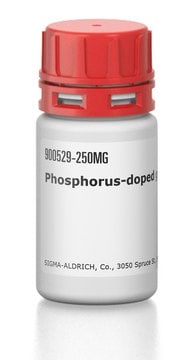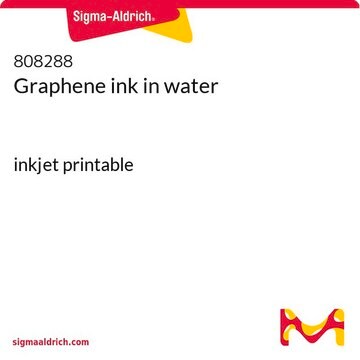900528
Doped graphene
sulfur-doped, avg. no. of layers, 1 ‑ 5
Synonym(s):
S-Doped graphene
Sign Into View Organizational & Contract Pricing
All Photos(1)
About This Item
UNSPSC Code:
12352200
NACRES:
NA.23
Recommended Products
product name
Sulfur-doped graphene, avg. no. of layers, 1 ‑ 5
Assay
≥95%
Quality Level
form
powder
feature
avg. no. of layers 1 ‑ 5
composition
Carbon, 85-95%
Oxygen, <7.5%
Sulfur, 2.0-4.0%
surface area
>500 m2/g , BET
Related Categories
General description
- Typical thickness: 1-5 layers.
- Typical size : 0.5-5 μm.
Application
- Electrocatalyst.
- Field-effect transistors.
- Sensors.
- Lithium ion batteries.
- Supercapacitors.
Storage Class Code
11 - Combustible Solids
WGK
WGK 3
Flash Point(F)
Not applicable
Flash Point(C)
Not applicable
Choose from one of the most recent versions:
Already Own This Product?
Find documentation for the products that you have recently purchased in the Document Library.
Simultaneous sulfur doping and exfoliation of graphene from graphite using an electrochemical method for supercapacitor electrode materials.
Parveen N, et al.
Journal of Material Chemistry A, 4(1), 233-240 (2016)
Zhi Yang et al.
ACS nano, 6(1), 205-211 (2011-12-29)
Tailoring the electronic arrangement of graphene by doping is a practical strategy for producing significantly improved materials for the oxygen-reduction reaction (ORR) in fuel cells (FCs). Recent studies have proven that the carbon materials doped with the elements, which have
Zhaoling Ma et al.
Angewandte Chemie (International ed. in English), 54(6), 1888-1892 (2014-12-09)
Heteroatom-doped carbon materials have been extensively investigated as metal-free electrocatalysts to replace commercial Pt/C catalysts in oxygen reduction reactions in fuel cells and Li-air batteries. However, the synthesis of such materials usually involves high temperature or complicated equipment. Graphene-based sulfur
Articles
Advances in scalable synthesis and processing of two-dimensional materials
Our team of scientists has experience in all areas of research including Life Science, Material Science, Chemical Synthesis, Chromatography, Analytical and many others.
Contact Technical Service






![[6,6]-Phenyl C61 butyric acid methyl ester ≥99%](/deepweb/assets/sigmaaldrich/product/structures/359/221/d990c746-0960-4c69-bf76-fe09b193824d/640/d990c746-0960-4c69-bf76-fe09b193824d.png)
